- Home
- Warhammer 40K
Lightning Run - Peter McLean Page 3
Lightning Run - Peter McLean Read online
Page 3
The plane shuddered violently, and the flashing red runes on the console told a grim tale of structural damage.
‘I’m Navy!’ she shouted into the vox. ‘Hold fire, you stupid mudfoots!’
The troops on the ground either couldn’t hear her, or they simply didn’t believe her. She was past the missile defences now, but there were Hydra batteries down there somewhere in the green. Several of them.
They opened up all at once, their quad-barrelled autocannons spitting an eruption of Imperial fury into her path. Sal swallowed in a dry mouth. She could climb above their effective range, of course, but not if she hoped to make a landing at Patroclus.
She had to get down there, and get down safe with the general’s secrets intact.
A burst of rounds smacked into the belly of the plane, tearing more chunks out of the light armour and taking out half her electronics. The console display died.
Whatever it takes.
‘O Emperor, forgive me,’ Sal whispered.
Win this war, pilot. The Emperor expects.
She knew she had to. Whatever the general had given her, he believed the secrets contained on the encrypted crystal in that ring could carry the whole war on Elijan III. That would save tens of thousands, maybe hundreds of thousands of lives. What were a few mudfoot Hydra crews, compared to that?
They were human. They were, each and every one of them, the divine sparks of the Emperor’s will. They were her comrades, her brothers and sisters in arms. They were shooting at her, yes, but only because they believed her to be an avatar of the Archenemy. They didn’t know any better.
Sal did know better, she thought as she jinked the screaming plane around yet another burst of murderous anti-aircraft fire. The tortured airframe moaned in protest, and she knew the Lightning wouldn’t survive much more of this. Not at this speed and altitude, not with the damage it had already taken. There was just no way.
She had no choice.
The Emperor expects every woman to do her duty, however hard it may be.
Sal keyed the head-up display and brought the plane around until the four triangles converged on the shape of a Hydra flak tank. There were tears in her eyes.
‘Forgive me,’ she whispered, and squeezed the trigger. ‘Emperor forgive me, for I know exactly what I do.’
The ventral-mounted autocannon blew the machine apart with a two-second burst of supersonic munitions. There couldn’t possibly have been any survivors.
‘I’m Navy!’ Sal screamed into the vox. ‘For the Emperor’s love, let me reach Patroclus base!’
The vox returned a howl of static, but now she was this far away from the cultist’s base their signal jamming seemed to be out of range. Words fizzed in her ears, hardly intelligible.
‘…ing traitor! By…’
‘No!’ Sal shouted, working the vox frequency shifter with her left hand even as she fought the stick with the other, narrowly avoiding another burst of anti-aircraft fire. ‘Listen, please! Navy Intelligence! Colonel Shrake! Get me–’
One of the Hydras traversed its four swivel-mounted weapons and raked the side of her plane, punching rounds clean through the fuselage. Sal screamed as red-hot adamantium shot through the cockpit, taking a bloody chunk out of the meat of her left shoulder as it went. Her blood splattered against the inside of the canopy, running down the pane to mingle with the tainted, corrupt fluids that already profaned the Lightning. Sal tried hard not to think about what that meant. Wind howled around her as the cockpit violently depressurised.
She overshot the Hydra but there was small-arms fire snapping at her now, and she could see a four-man heavy weapons team hurriedly setting up a missile launcher.
She was out of chaff.
No choice, Salvatoria, she told herself. There’s no choice.
The autocannon turned them into red mist against the green.
She brought the crippled plane around and zeroed in on the second Hydra battery. Her head-up display finally died.
Aiming by eye alone, Sal angled the nose of the Lightning down into a steep attack run and let rip with her ventral weapon. The Hydra erupted in a volcano of merciless fire as its magazine went up, and took its nearby Chimera munitions tender with it. Three of the Chimera crew bailed out, blazing like human torches as they died. Sal could hear their screams of agony, if only in her mind.
She hauled back on the stick and the Lightning creaked and groaned in protest as it came out of its dive, shedding chunks of metal into the air as she hauled it around and back onto course.
The vox fizzed in her ear, a new voice.
‘…intelligencer. Col… Shrake… words?’
The shooting had stopped for the moment and now Patroclus base was coming into view, the long runway waiting for her. It was lined with Hydras, and they were all pointed at her.
Sal wracked her brains for the general’s words.
‘Ave Imperator,’ she said at last, ‘in circulum arcanus trismegistus est!’
‘Hold fire. All… hold fire.’
The vox signal was getting cleaner as she began her landing approach. There was no other option now – the Lightning was finished. It was a wonder it was still in the air at all, and Sal knew that her only choices were to attempt the landing and risk getting blown to pieces by the Hydras, or simply fall apart in the sky.
She took a shaky breath and keyed the landing gear.
Nothing happened.
Was this the Emperor’s judgement, for the awful choice she had made? Was He about to smash her into the runway like a bug, in righteous retribution? No, she told herself. No, she did His work here.
His will be done.
She ripped open the emergency hatch to the left of her seat and found the crank handle. It was stiff, obviously too long since it had last been properly maintained, but it turned. Wincing with pain and effort, Sal cranked the landing gear down by hand. The wound in her shoulder howled at her as it ripped further open, the broken bones grinding together under the torn flesh, and blood streamed down her arm and into the emergency cavity until the handle was slick with it.
She gave thanks to the Emperor that she still had enough hydraulic power to lower the flaps, at least, but all the same the crippled plane hit hard and bounced. The tearing agony in her shoulder made Sal scream as her crash webbing bit savagely into it, but she found the air brake lever through greying vision and threw it forward even as she slammed the throttles into reverse thrust.
The Lightning hit the ground again and slewed sideways for a moment, threatening to roll. Sal prayed and screamed and hauled it around at the last moment, righting it in a great, stinking cloud of promethium exhaust and vaporised tyre smoke.
She throttled back to idle, sagged in her webbing and passed out.
The after-action report was difficult, to say the least.
Colonel Shrake was a woman in her early one-twenties, with short, iron-grey hair and a badly scarred face that the patch over her left eye did little to hide.
She fixed her one remaining eye on Sal and said nothing.
Sal was sitting across a table from her in a small debriefing room, her shoulder field-dressed and her left arm bound to her chest in a tight sling. It hurt like murder, but it was nothing compared to the pain in her heart.
Two large men in the heavy carapace armour of the Militarum Tempestus stood behind the colonel’s chair, matt-black hellguns in their hands.
The colonel looked down at her data-slate for a moment.
‘So, one more time,’ she said, her voice like a Fenrisian winter. ‘You are not, in fact, an intelligencer. You are a Navy rating, rank of pilot flight officer, no more than that, and yet you are possessed of a crimson-level security passphrase and the single most important intelligence artefact in this entire theatre of war.’
Sal cleared her throat. She was very thirsty, but no one had
offered her anything to drink.
‘Yes, ma’am,’ she said.
‘You came into possession of these things after crashing the transport that carried my good friend and colleague General Gobrecht, leaving no survivors but yourself. After this you stole a Chaos-corrupted Lightning from an enemy airbase and flew here, murdering twenty-nine Imperial soldiers and destroying three valuable war machines in the process. Is that correct, Pilot Grant?’
‘That’s not–’ she started, but the colonel’s head snapped up and she glared at her until Sal’s resolve crumbled. ‘Yes, ma’am,’ she whispered, and lowered her eyes in shame.
Here it comes, Sal thought. I’m for the firing squad for sure.
‘Nonsense,’ Colonel Shrake said.
Sal looked up in sudden shock as a slow, reptilian smile crossed the colonel’s face.
‘Ma’am?’
‘Acceptable losses, pilot. They lived to serve the Emperor, and they died in service. Don’t you understand? Dying is what soldiers are for. You are a heroine of the Imperium. You’d better get used to it.’
Sal wouldn’t be leaving Elijan III on the Damocles.
She was done with Navy life, or so her handler told her. When the time came, she would depart on a sleek, fast ship belonging to the Navy’s intelligencers. What happened after that, she didn’t know. Nobody would tell her.
Elijan III was over with, anyway. The Imperial victory had been decisive, crushing and brutally fast. Single-handedly, she had made that happen. Her, Salvatoria Grant, Heroine Pilot of the Imperium.
A heroine who cried herself drunkenly to sleep in her private room in the medicae block of the barracks every night.
Her handler knocked on the door of the room where she was still supposedly convalescing from her surgery. What she was really doing, most of the time, was drinking herself into oblivion. Nobody seemed to care, so long as she got her lines right. Her handler marched into the room, and gave her a stiff salute. He was a Militarum Tempestus sergeant, and he wore full dress uniform.
‘Ma’am,’ he said smoothly, pretending not to notice the raw redness of her eyes. ‘They’re ready for you now.’
Sal nodded and stood up, swaying slightly on her boot heels. Her knuckles were white around the glass of sacra in her hand. Her sixth that morning, she thought, or maybe her seventh, but she couldn’t be sure. She never could, any more.
She was in full Navy dress herself, the starched jacket uncomfortably tight over her still-healing shoulder. They’d had to fit an augmetic joint to save her arm, in the end. It hurt all the time, every minute of the day and night. Especially the nights. Sal clung to that pain, embraced it.
Deserved it.
She gulped her sacra and put the glass unsteadily down on the low table in front of her.
It was time to face the massed ranks of the Astra Militarum again.
Time to be the heroine, again. The newest face of the Imperial propaganda machine.
Her handler reached into his uniform jacket and produced a pair of mirrored pilot’s glasses, and handed them to her without a word.
She dutifully put them on to hide her red eyes, and followed the sergeant out of the medicae block. He led her down a corridor and out onto the square where the second Guard regiment awaited her, drawn up in parade formation.
Sal missed the Navy. She missed the freedom of flight, the furious glory of aerial assault. The space to breathe that was now denied to her.
Before her latest surgery, she had attended twenty-nine military funerals, closely watched at all times by two of Shrake’s hulking Militarum Tempestus Scions.
She had sobbed like a child at every single one.
Once she had given her pre-prepared, pre-approved, heavily rehearsed speech to the assembled mudfoots and they had duly applauded and saluted and praised her in the Emperor’s name, her handler escorted her back to her room in the medicae block.
‘You should rest,’ he said.
That wasn’t a suggestion, Sal knew.
The sergeant turned on his heel and left the room, and she heard the key turn in the lock behind him. Sal poured herself a sacra and walked to the window, gazing out in despair.
It was getting dark outside now, and the barrack block’s floodlights were coming on. Not that they were needed, not any more.
Outside, on the raked gravel in front of the building where the Chimeras were parked in long lines, a huge, flickering ten-storey hologram lit up the night. It showed a young Imperial Navy pilot, taller and leaner and better-looking than Sal had ever been in her life, her hands braced on her hips as she stared into the distance with her chin raised in defiance. A caption hung in the air above it, the words fully twenty feet tall above the towering figure.
It read Salvatoria Grant, Heroine of the Imperium!
The key, turning in the door to lock her in – the newest tool of the Imperial propaganda effort.
The Militarum Tempestus troopers, never letting her out of their sight.
Twenty-nine funerals.
Salvatoria Grant sat down on her hospital bed, put her head in her hands, and she wept.
About the Author
Peter McLean was born near London in 1972, the son of a bank manager and an English teacher. He went to school in the shadow of Norwich Cathedral where he spent most of his time making up stories. By the time he left school this was probably the thing he was best at, alongside the Taoist kung fu he had been studying since the age of 13. He grew up in the Norwich alternative scene, alternating dingy nightclubs with martial arts and practical magic. He has since grown up a bit, if not a lot, and spent 25 years working in corporate IT. He is married to Diane and is still making up stories. Baphomet by Night is his first story for Black Library.
An extract from Glory Imperialis Omnibus.
Carson scrambled over the rocks at the head of his men. He hadn’t given any orders; he hadn’t needed to. His men knew what was happening, and they knew what to do. Every single one of them was a veteran. Every single one had been fighting since the first campaign of the Ellinor Crusade to here. They’d been soldiers for more years than everything else they’d ever been. He had left his position on the line; Red had gone with him, and the men silently laid down their packs and followed after. Words were simply no longer needed.
He had led them hard south, taking them around onto the reverse of the ridge that led back down the valley. They ran in amongst the stacks and rock chimneys which made the craggy terrain look almost as though it were a field of giant wheat made of stone. They went fast, swarming up the slope and over the broken, treacherous ground. Their step was sure, their movement confident and quiet. Anything they had been originally issued which rattled or clinked or flapped had been secured or disposed of long before.
The men grouped automatically in their sections, each man knowing his place in formation behind his corporal. The corporals focused ahead, each one forging his own path so as to avoid congestion or bottlenecks that would slow their advance or draw the enemy’s eye. The sections rushed through concealed gullies, the men tightening into a column to thread their way through narrow gaps between chimneys and then dispersing back into formation once on the other side. They kept low over rises to reduce their profile and, no matter how steep their path became, they always kept their lasrifles in their grasps.
They went fast. Faster than they should. Faster than doctrine allowed. Carson knew it was a risk, but neither he nor any of his men could abide any further delay. Their attack was a strike to the throat that would take grip and then throttle the life from their foe.
It was a risk that paid off. Whilst the Charasians had some fine shots amongst their kind, Carson knew they were not soldiers. The tribe-males had allowed their attention to focus entirely on their victims in the Boy Company; they all wanted to score a kill against their liberators. They thought they had hidden themselves well,
but the faint discharges from the Kartha weapons their former overlords had left them were all Carson needed. Their very firing stances, low and crouched over, helped conceal the Brimlock platoon as it closed in on them from their left and behind. There were only a dozen or so metres left between Carson and the rearmost of the Charasian positions and still no warning had been shouted. Just like their targets a few minutes earlier, the Charasians did not stand a chance.
Carson did not need to order the attack. He merely had to think it. His men acted as he knew they would. They sprinted the last few metres and launched themselves at the enemy. The heavy butts of lasrifles smashed against the backs of unprotected Charasian heads, smashing their skulls or knocking them cold so there would be no shouts of pain when the lasrifles were reversed and bayonets impaled their flesh. One realised the danger a moment too soon and Carson heard a xenos shriek that carried over the sound of the continual gunfire.
Grenades, Carson thought, and he saw them fly down into the midst of the Charasian hiding places. Their firing stopped and for a split second there was no sound but a single voice gabbling xenos words. Then there was the crump-crump-crump of the detonations and blood-mist sprayed into the air. The screaming began for real: screams of pain from those struck and of panic from those who had been so confident a moment before, but were now realising the peril they were in. They were turning, desperate to target the threat that had appeared right behind them.
Volley, Carson thought, and las-shots from Brimlock rifles flashed around him. Through the spurs and jagged outcrops, few struck true, but the crack of the shots as they splintered off rock and the hiss of the air as the beams passed nearby convinced the remaining Charasians that they had been outflanked by far greater numbers than a mere platoon. There was no return fire. The Charasians were surprised, a few of them were dead, but the rest were safe in their dug-in positions. If the Brimlock Guardsmen hesitated, gave them even a minute to recover and collect themselves, the Charasians could have stayed put and unleashed a withering fire on the Guardsmen now so visible coming over the ridge above them.

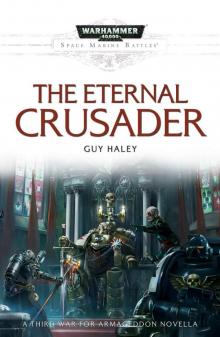 The Eternal Crusader - Guy Haley
The Eternal Crusader - Guy Haley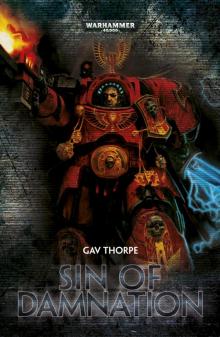 Sin of Damnation - Gav Thorpe
Sin of Damnation - Gav Thorpe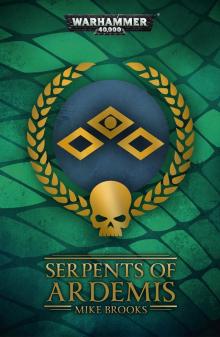 Serpents of Ardemis - Mike Brooks
Serpents of Ardemis - Mike Brooks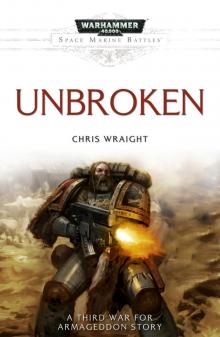 Unbroken - Chris Wraight
Unbroken - Chris Wraight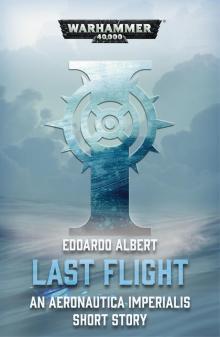 Last Flight - Edoardo Albert
Last Flight - Edoardo Albert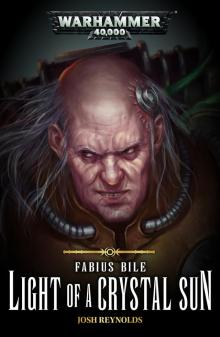 Light of a Crystal Sun - Josh Reynolds
Light of a Crystal Sun - Josh Reynolds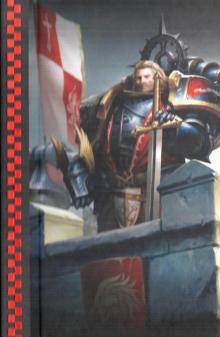 Lion El'Jonson- Lord of the First - David Guymer
Lion El'Jonson- Lord of the First - David Guymer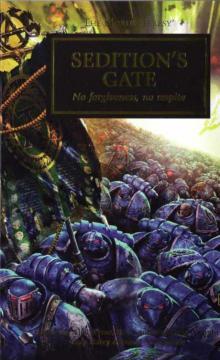 Sedition's Gate - Nick Kyme & Chris Wraight
Sedition's Gate - Nick Kyme & Chris Wraight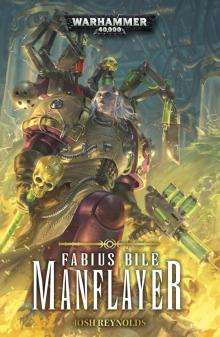 Manflayer - Josh Reynolds
Manflayer - Josh Reynolds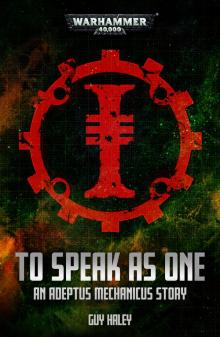 To Speak as One - Guy Haley
To Speak as One - Guy Haley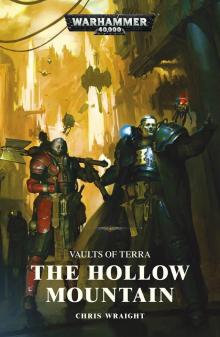 Vaults of Terra- The Hollow Mountain - Chris Wraight
Vaults of Terra- The Hollow Mountain - Chris Wraight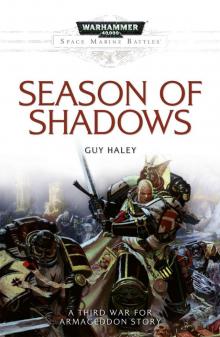 Season of Shadows - Guy Haley
Season of Shadows - Guy Haley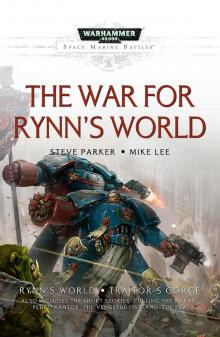 The War for Rynn's World - Steve Parker & Mike Lee
The War for Rynn's World - Steve Parker & Mike Lee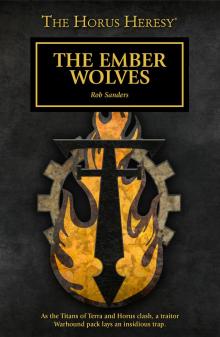 The Ember Wolves - Rob Sanders
The Ember Wolves - Rob Sanders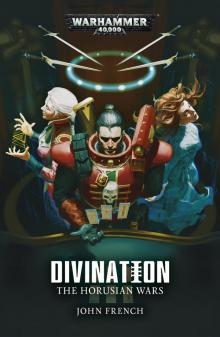 Divination - John French
Divination - John French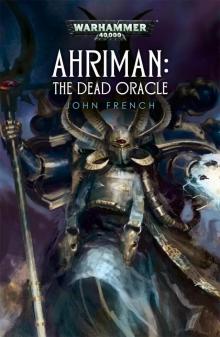 The Dead Oracle - John French
The Dead Oracle - John French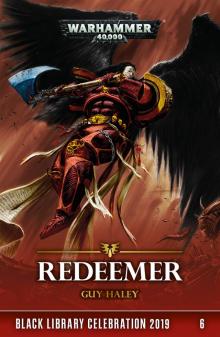 Redeemer - Guy Haley
Redeemer - Guy Haley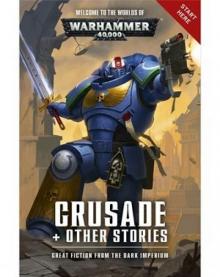 Crusade & Other Stories - Dan Abnett Et Al.
Crusade & Other Stories - Dan Abnett Et Al.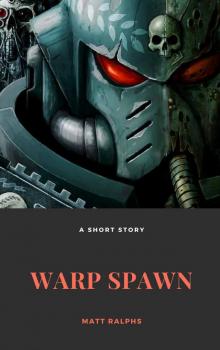 Warp Spawn - Matt Ralphs
Warp Spawn - Matt Ralphs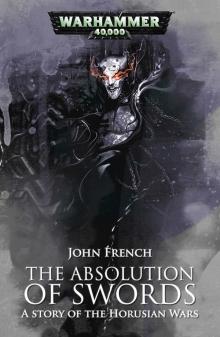 The Absolution of Swords - John French
The Absolution of Swords - John French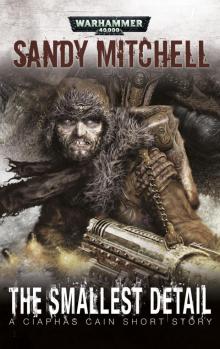 The Smallest Detail - Sandy Mitchell
The Smallest Detail - Sandy Mitchell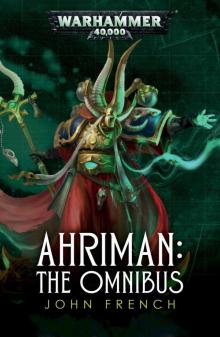 The Omnibus - John French
The Omnibus - John French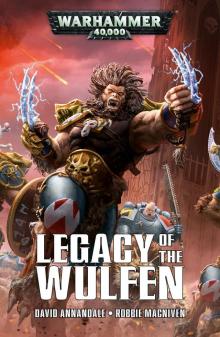 Legacy of the Wulfen - David Annandale & Robbie MacNiven
Legacy of the Wulfen - David Annandale & Robbie MacNiven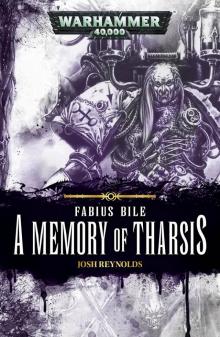 A Memory of Tharsis - Josh Reynolds
A Memory of Tharsis - Josh Reynolds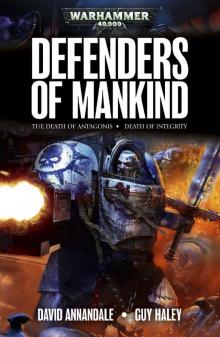 Defenders of Mankind - David Annandale & Guy Haley
Defenders of Mankind - David Annandale & Guy Haley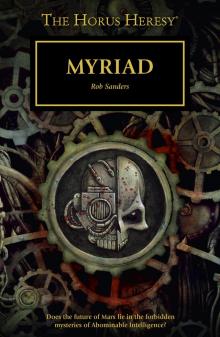 Myriad - Rob Sanders
Myriad - Rob Sanders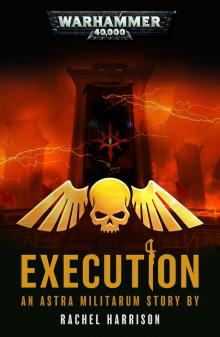 Execution - Rachel Harrison
Execution - Rachel Harrison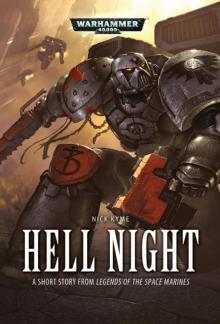 Hell Night - Nick Kyme
Hell Night - Nick Kyme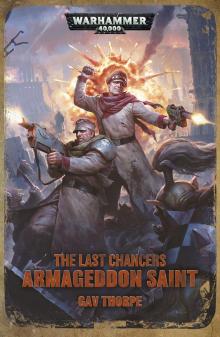 Armageddon Saint - Gav Thorpe
Armageddon Saint - Gav Thorpe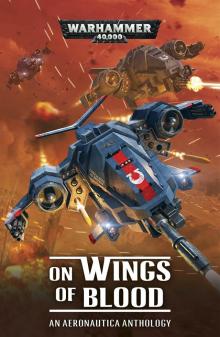 On Wings of Blood
On Wings of Blood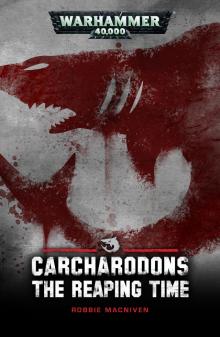 The Reaping Time - Robbie MacNiven
The Reaping Time - Robbie MacNiven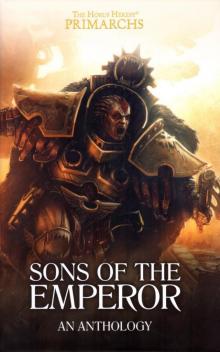 Sons of the Emperor
Sons of the Emperor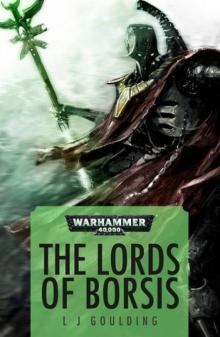 The Lords of Borsis - L J Goulding
The Lords of Borsis - L J Goulding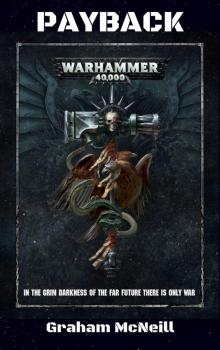 Payback - Graham McNeill
Payback - Graham McNeill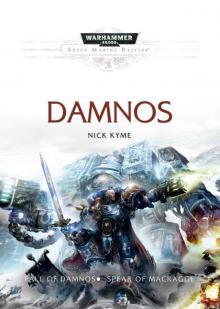 Damnos - Nick Kyme
Damnos - Nick Kyme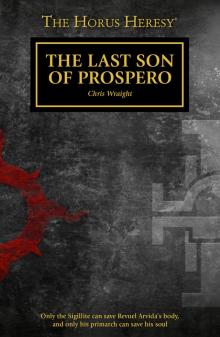 The Last Son of Prospero - Chris Wraight
The Last Son of Prospero - Chris Wraight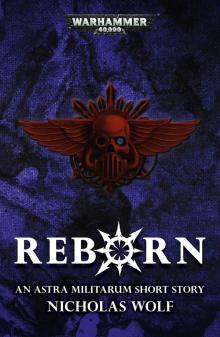 Reborn - Nicholas Wolf
Reborn - Nicholas Wolf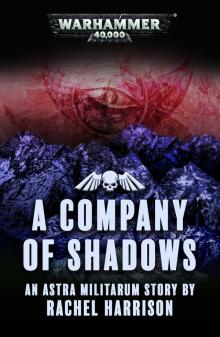 A Company of Shadows - Rachel Harrison
A Company of Shadows - Rachel Harrison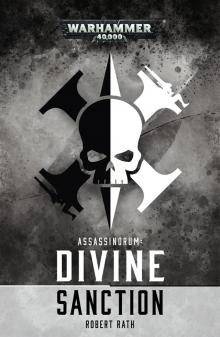 Assassinorum- Divine Sanction - Robert Rath
Assassinorum- Divine Sanction - Robert Rath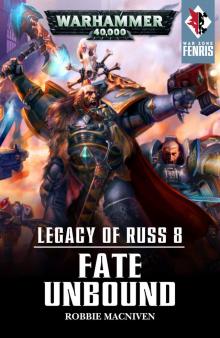 Fate Unbound - Robbie MacNiven
Fate Unbound - Robbie MacNiven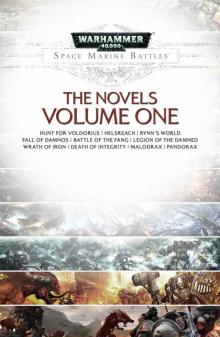 Space Marine Battles - the Novels Volume 1
Space Marine Battles - the Novels Volume 1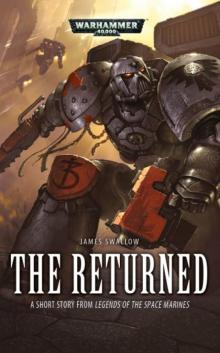 The Returned - James Swallow
The Returned - James Swallow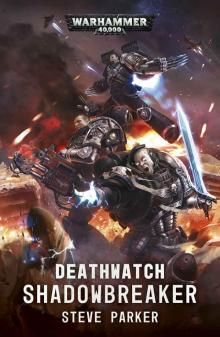 Shadowbreaker - Steve Parker
Shadowbreaker - Steve Parker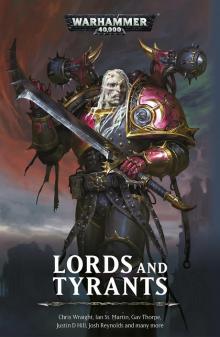 Lords and Tyrants
Lords and Tyrants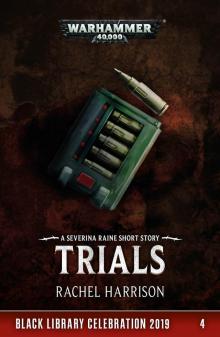 Trials - Rachel Harrison
Trials - Rachel Harrison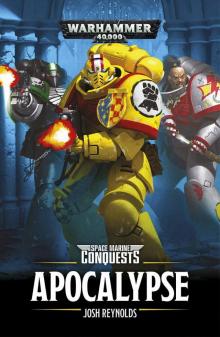 Apocalypse - Josh Reynolds
Apocalypse - Josh Reynolds The labyrinth - Richard Ford
The labyrinth - Richard Ford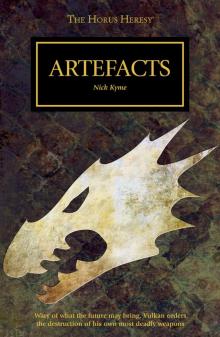 Artefacts - Nick Kyme
Artefacts - Nick Kyme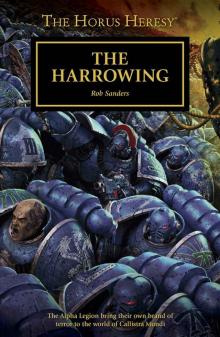 The Harrowing - Rob Sanders
The Harrowing - Rob Sanders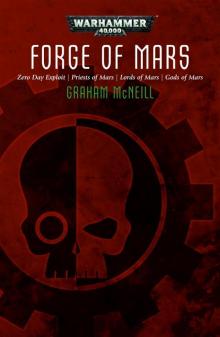 Forge of Mars - Graham McNeill
Forge of Mars - Graham McNeill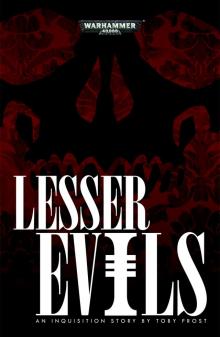 Lesser Evils - Toby Frost
Lesser Evils - Toby Frost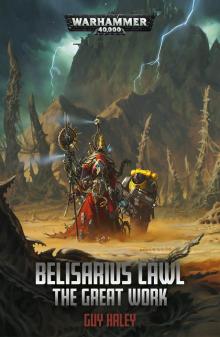 Belisarius Cawl- the Great Work - Guy Haley
Belisarius Cawl- the Great Work - Guy Haley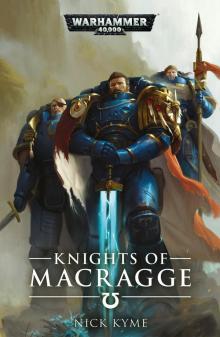 Knights of Macragge - Nick Kyme
Knights of Macragge - Nick Kyme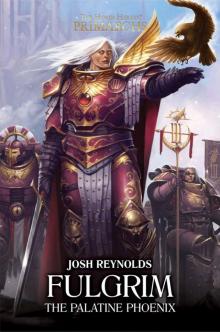 Fulgrim- The Palatine Phoenix - Josh Reynolds
Fulgrim- The Palatine Phoenix - Josh Reynolds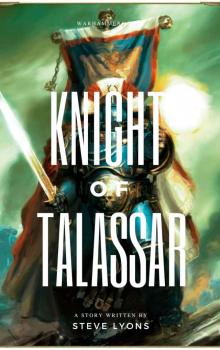 Knight of Talassar - Steve Lyons
Knight of Talassar - Steve Lyons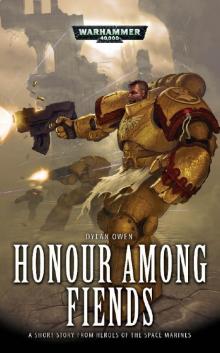 Honour Among Fiends - Dylan Owen
Honour Among Fiends - Dylan Owen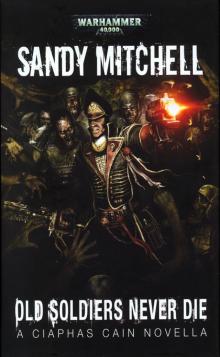 Old Soldiers Never Die - Sandy Mitchell
Old Soldiers Never Die - Sandy Mitchell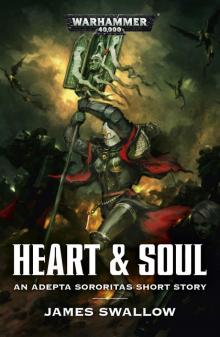 Heart & Soul - James Swallow
Heart & Soul - James Swallow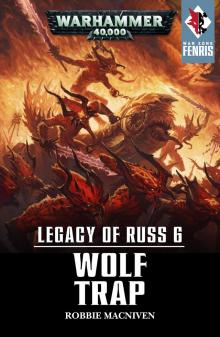 Wolf Trap - Robbie MacNiven
Wolf Trap - Robbie MacNiven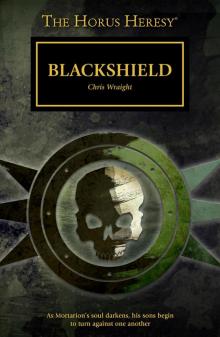 Blackshield - Chris Wraight
Blackshield - Chris Wraight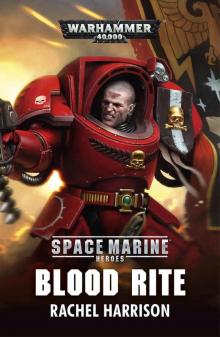 Blood Rite - Rachel Harrison
Blood Rite - Rachel Harrison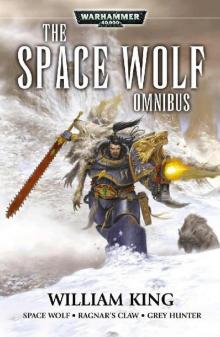 The Space Wolf Omnibus - William King
The Space Wolf Omnibus - William King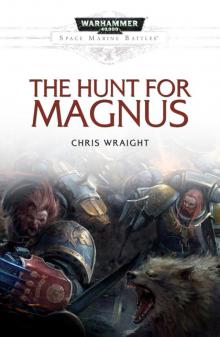 The Hunt for Magnus - Chris Wraight
The Hunt for Magnus - Chris Wraight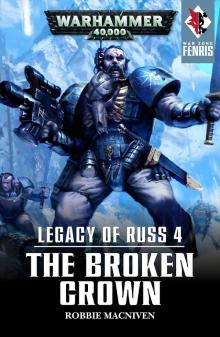 The Broken Crown - Robbie MacNiven
The Broken Crown - Robbie MacNiven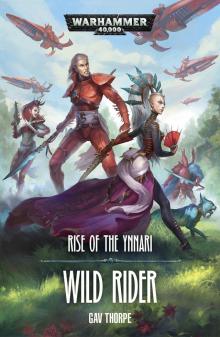 Wild Rider - Gav Thorpe
Wild Rider - Gav Thorpe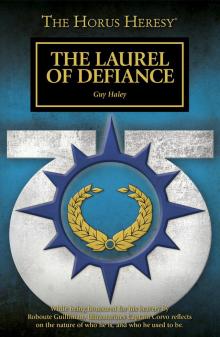 The Laurel of Defiance - Guy Haley
The Laurel of Defiance - Guy Haley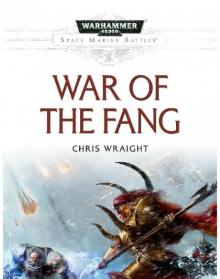 War of the Fang - Chris Wraight
War of the Fang - Chris Wraight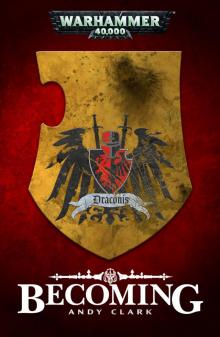 Becoming - Andy Clark
Becoming - Andy Clark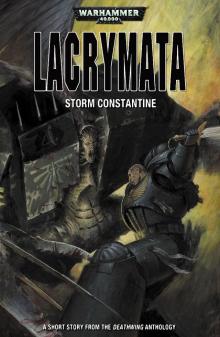 Lacrymata - Storm Constantine
Lacrymata - Storm Constantine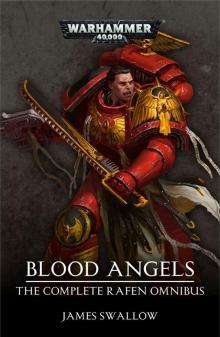 Blood Angels - The Complete Rafen Omnibus - James Swallow
Blood Angels - The Complete Rafen Omnibus - James Swallow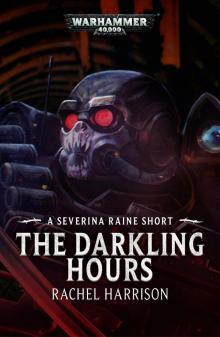 The Darkling Hours - Rachel Harrison
The Darkling Hours - Rachel Harrison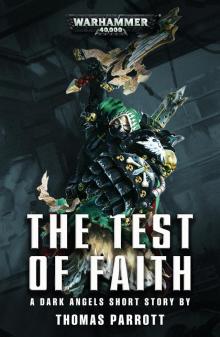 The Test of Faith - Thomas Parrott
The Test of Faith - Thomas Parrott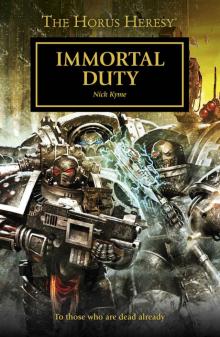 Immortal Duty - Nick Kyme
Immortal Duty - Nick Kyme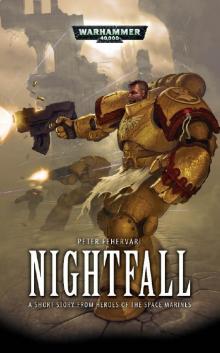 Nightfall - Peter Fehervari
Nightfall - Peter Fehervari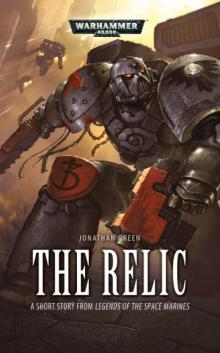 The Relic - Jonathan Green
The Relic - Jonathan Green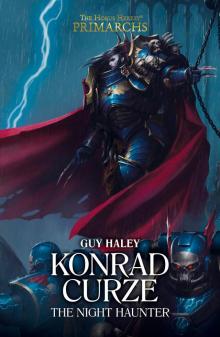 Konrad Curze the Night Haunter - Guy Haley
Konrad Curze the Night Haunter - Guy Haley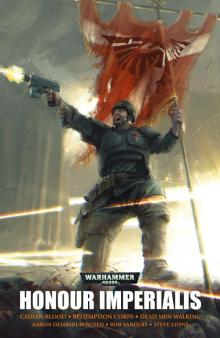 Honour Imperialis - Aaron Dembski-Bowden
Honour Imperialis - Aaron Dembski-Bowden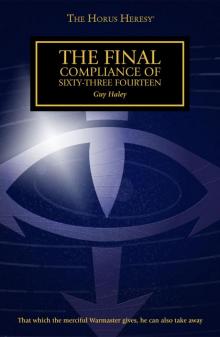 The Final Compliance of Sixty-Three Fourteen - Guy Haley
The Final Compliance of Sixty-Three Fourteen - Guy Haley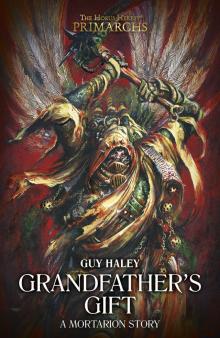 Grandfather’s Gift - Guy Haley
Grandfather’s Gift - Guy Haley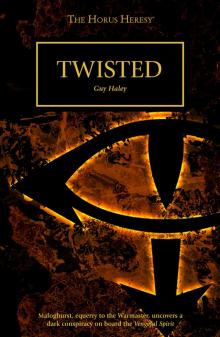 Twisted - Guy Haley
Twisted - Guy Haley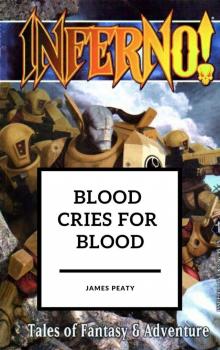 Blood Cries for Blood - James Peaty
Blood Cries for Blood - James Peaty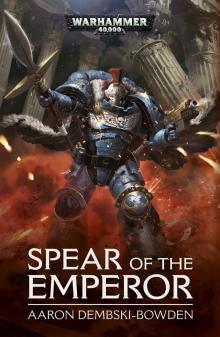 Spear of the Emperor - Aaron Dembski-Bowden
Spear of the Emperor - Aaron Dembski-Bowden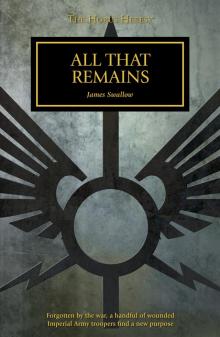 All That Remains - James Swallow
All That Remains - James Swallow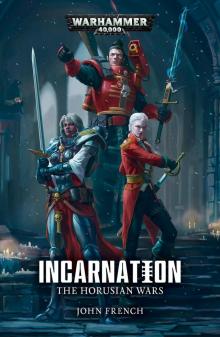 Incarnation - John French
Incarnation - John French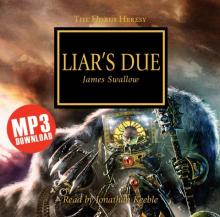 Liar's Due - Ben Swallow
Liar's Due - Ben Swallow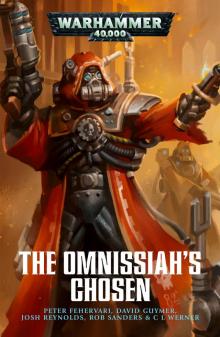 The Omnissiah's Chosen - Peter Fehervari
The Omnissiah's Chosen - Peter Fehervari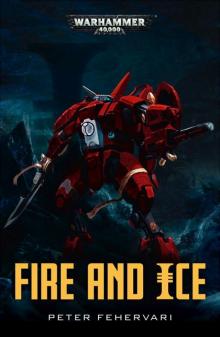 Fire and Ice - Peter Fehervari
Fire and Ice - Peter Fehervari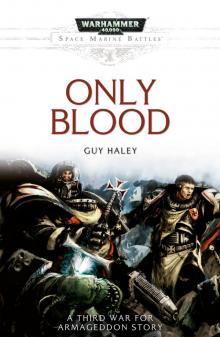 Only Blood - Guy Haley
Only Blood - Guy Haley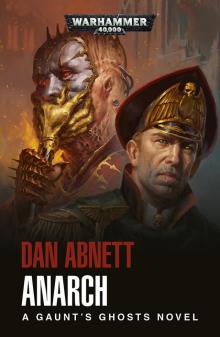 Anarch - Dan Abnett
Anarch - Dan Abnett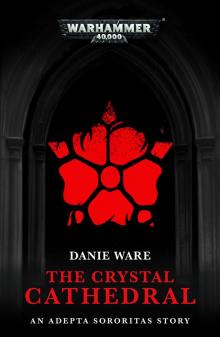 The Crystal Cathedral - Danie Ware
The Crystal Cathedral - Danie Ware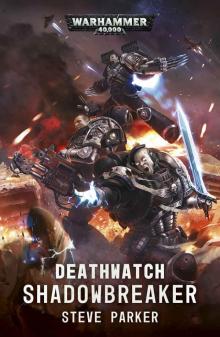 Shadowbreaker
Shadowbreaker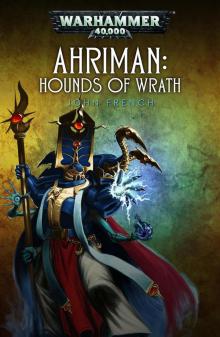 Hounds of Wrath - John French
Hounds of Wrath - John French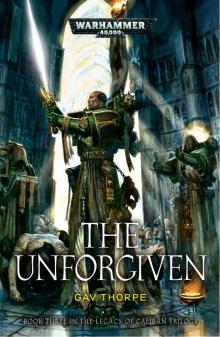 The Unforgiven - Gav Thorpe
The Unforgiven - Gav Thorpe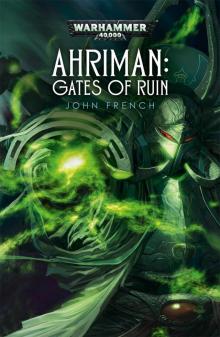 Gates of Ruin - John French
Gates of Ruin - John French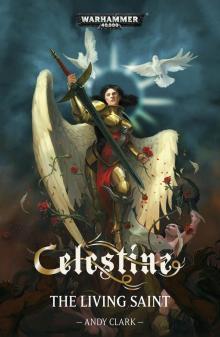 Celestine - Andy Clark
Celestine - Andy Clark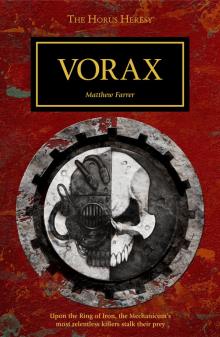 Vorax - Matthew Farrer
Vorax - Matthew Farrer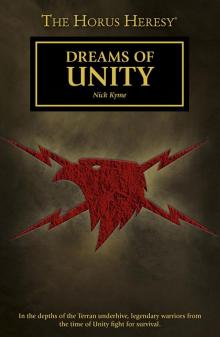 Dreams of Unity - Nick Kyme
Dreams of Unity - Nick Kyme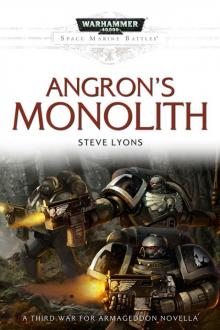 Angron's Monolith - Steve Lyons
Angron's Monolith - Steve Lyons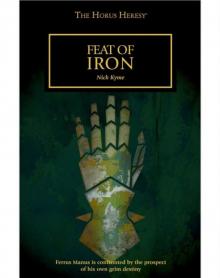 Feat of Iron - Nick Kyme
Feat of Iron - Nick Kyme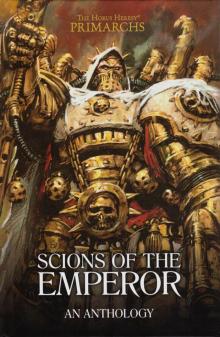 Scions of the Emperor
Scions of the Emperor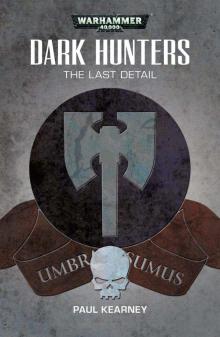 The Last Detail - Paul Kearney
The Last Detail - Paul Kearney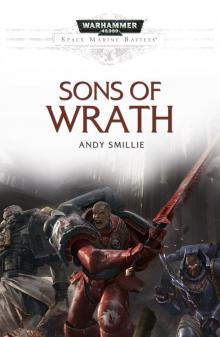 Sons of Wrath - Andy Smillie
Sons of Wrath - Andy Smillie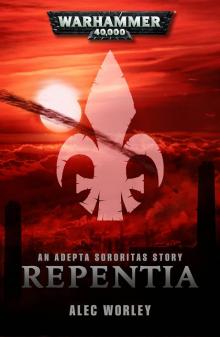 Repentia - Alec Worley
Repentia - Alec Worley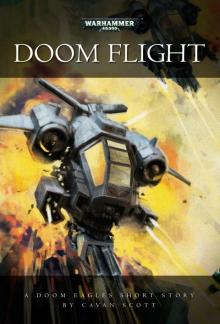 Doom Flight - Cavan Scott
Doom Flight - Cavan Scott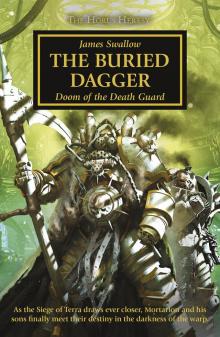 The Buried Dagger - James Swallow
The Buried Dagger - James Swallow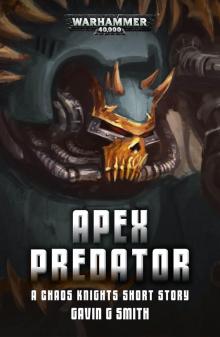 Apex Predator - Gavin G Smith
Apex Predator - Gavin G Smith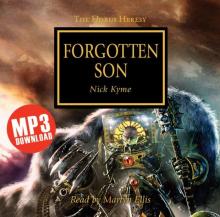 Forgotten Sons - Nick Kyme
Forgotten Sons - Nick Kyme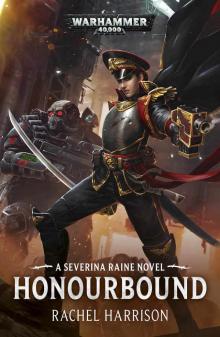 Honourbound - Rachel Harrison
Honourbound - Rachel Harrison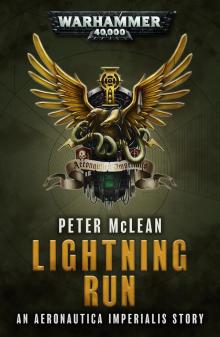 Lightning Run - Peter McLean
Lightning Run - Peter McLean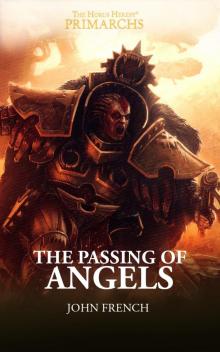 The Passing of Angels - John French
The Passing of Angels - John French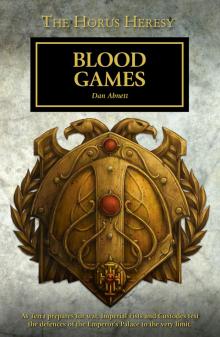 Blood Games - Dan Abnett
Blood Games - Dan Abnett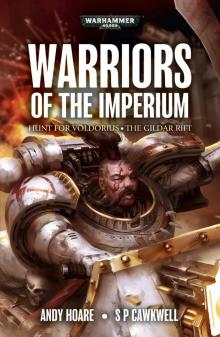 Warriors of the Imperium - Andy Hoare & S P Cawkwell
Warriors of the Imperium - Andy Hoare & S P Cawkwell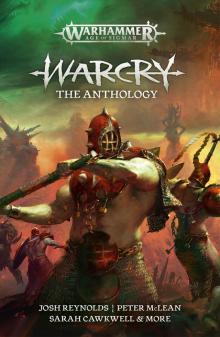 Warcry
Warcry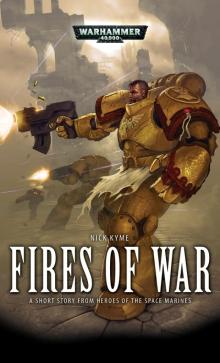 Fires of War - Nick Kyme
Fires of War - Nick Kyme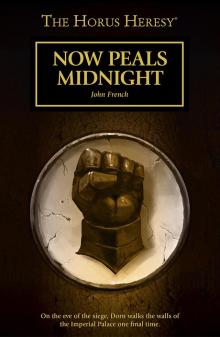 Now Peals Midnight - John French
Now Peals Midnight - John French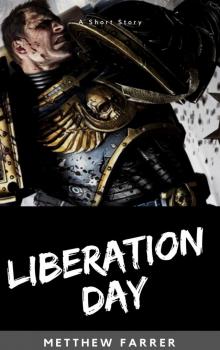 Liberation Day - Matthew Farrer
Liberation Day - Matthew Farrer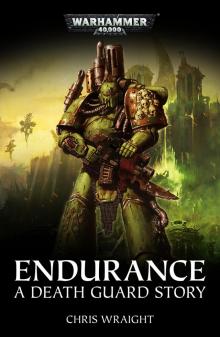 Endurance - Chris Wraight
Endurance - Chris Wraight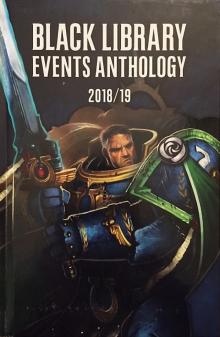 Black Library Events Anthology 2018-19
Black Library Events Anthology 2018-19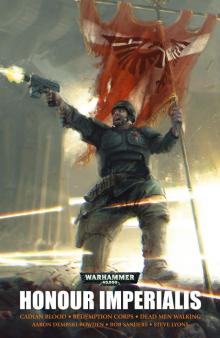 Honour Imperialis - Braden Campbell & Aaron Dembski-Bowden & Chris Dows & Steve Lyons & Rob Sanders
Honour Imperialis - Braden Campbell & Aaron Dembski-Bowden & Chris Dows & Steve Lyons & Rob Sanders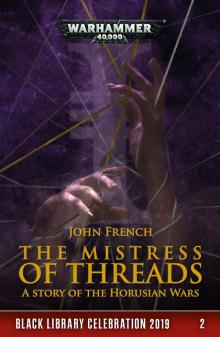 The Mistress of Threads - John French
The Mistress of Threads - John French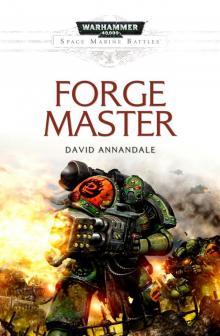 Forge Master - David Annandale
Forge Master - David Annandale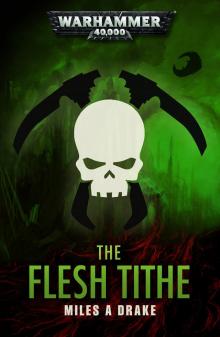 The Flesh Tithe - Miles A Drake
The Flesh Tithe - Miles A Drake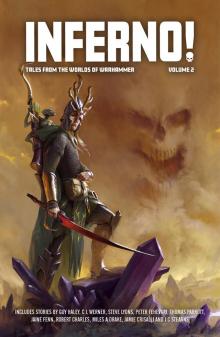 Inferno Volume 2 - Guy Haley
Inferno Volume 2 - Guy Haley Mercy of the Dragon - Nick Kyme
Mercy of the Dragon - Nick Kyme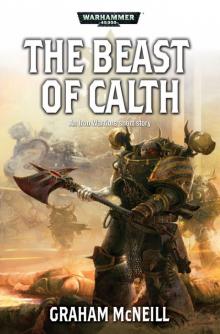 The Beast of Calth - Graham McNeill
The Beast of Calth - Graham McNeill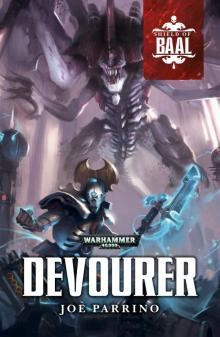 Devourer - Joe Parrino
Devourer - Joe Parrino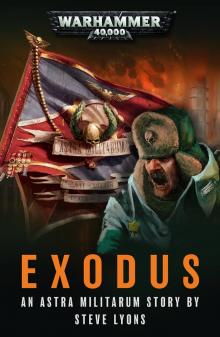 Exodus - Steve Lyons
Exodus - Steve Lyons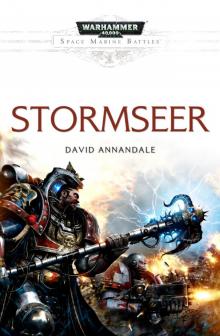 Stormseer - David Annandale
Stormseer - David Annandale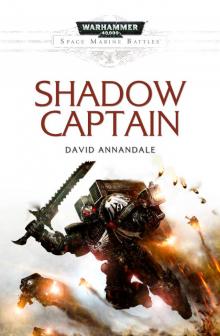 Shadow Captain - David Annandale
Shadow Captain - David Annandale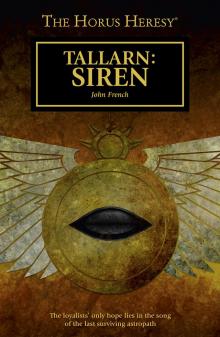 Tallarn- Siren - John French
Tallarn- Siren - John French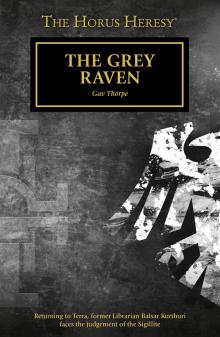 The Grey Raven - Gav Thorpe
The Grey Raven - Gav Thorpe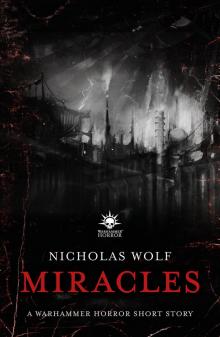 Miracles - Nicholas Wolf
Miracles - Nicholas Wolf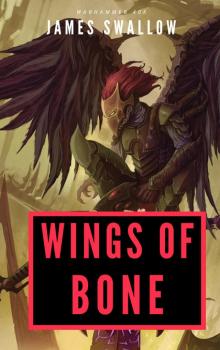 Wings of Bone - James Swallow
Wings of Bone - James Swallow